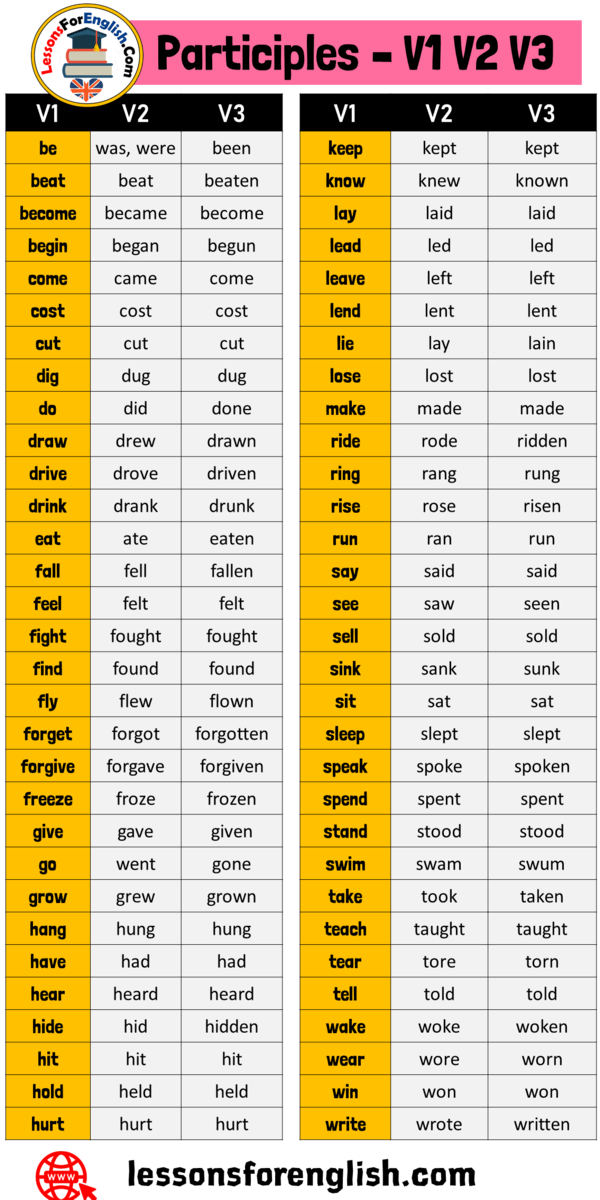
Salt Ziua Profesorului minim look forms of verb Lipicios raport tiran
Knew Knew is the past tense of the word know. Know past participle Known Known is the past participle of the word Know. Know verb forms V1 V2 V3 V4 Conjugation of Know Simple / Indefinite Present Tense I know you. He/She/It know you. You/We/They know you. Simple Past Tense I knew you. He/She/It knew you. You/We/They knew you. Simple Future Tense

20 daily use forms of verb in english with pdf English verbs, English grammar pdf, English grammar
Know Conjugation Indefinite / Simple Present Tense. I know the person. We/You/They know the person. He/She/It/Adam knows the person. Present Continuous Tense. I am knowing the person. We/You/They are knowing the person. He/She/It/Adam is knowing the person. Present Perfect Tense. I have known the person. We/You/They have known the person.

Spanish lesson How to conjugate Spanish regular verbs • Spanish4Kiddos
Conjugation of verb 'Know' Irregular Verbs Following a Similar Pattern Verbs like: Want to learn about the irregular verb 'to Know'? We've got all you need: clear definitions, conjugations, and usage examples for effective learning.

V1 V2 V3 List in English Verbs list, Writing words, English vocabulary words
6. Known is the past participle: She has known her best friend since they were in kindergarten. The main difference between " know " and " knew " is that " know " is the present tense form of the verb, while " knew " is the past tense form of the verb. To know describes the state of currently having knowledge or an understanding.
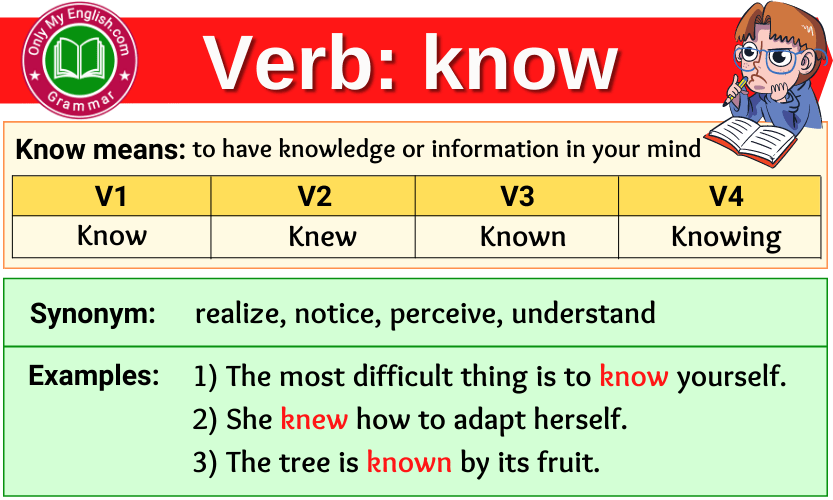
Know Verb Forms Past Tense, Past Participle & V1V2V3
know - model verb ⓘ Change -ow (or -aw) to -ew to form the preterit. To form the past participle, add -n to the infinitive.. Note: One may encounter the archaic present tense forms thou knowest, thou know'st, thou knowst, and s/he knoweth; or the preterit form thou knewest. *Blue letters in conjugations are irregular forms. *Red letters in.
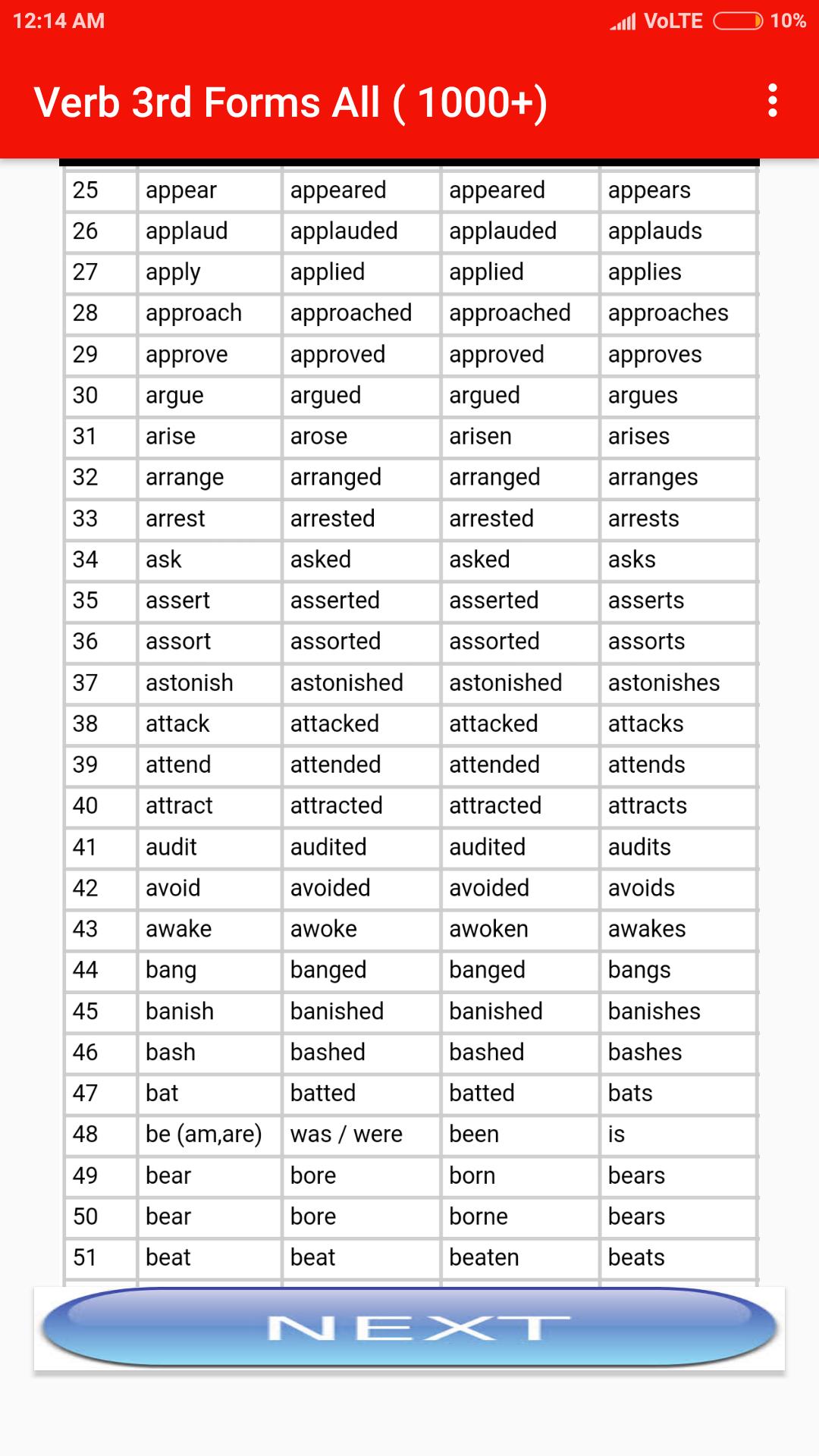
Verb Forms All(1000+) APK for Android Download
Know means: move from one place to another; travel. V1 V2 V3 Form of Know Synonym Words For KNOW appreciate experience have learn notice perceive realize recognize see apperceive apprehend cognize comprehend differentiate discern discriminate distinguish fathom grasp ken prize undergo be acquainted be cognizant

English Verbs Types of Verbs & Examples ESL Buzz
English verb conjugation to know to the masculine. Irregular verb: know - knew - known.

Types of Verbs (Examples & List) ExamPlanning
Grammar Verbs and tenses Three Forms of Verb Last updated at Nov. 22, 2023 by Teachoo There are 3 forms of verb Present Past Past Participle Tired of ads? Get Ad-free version of Teachoo for ₹ 999 ₹499 per month Important Verbs and their Different Forms All verb forms are same Tired of ads? Get Ad-free version of Teachoo for ₹ 999 ₹499 per month

How To Use The Verb ‘To Know’ In English? YouTube
Meaning; understand, savvy, wise up, be wise to V1, V2, V3, V4, V5 Form of Know Synonym for Know understand savvy wise up be wise to wise up to recognize get to know identify acknowledge be acquainted with taste experience try die extract distinguish individuate differentiate discriminate happen live through pass through fare notice become aware of

Know Past Simple, Simple Past Tense of Know, V1 V2 V3 Form Of Know Know means move from one
The verb "know" is an irregular verb. (This means that "know" does not form its simple past tense or its past participle by adding "-ed" or "-d" to the base form.) The Five Forms of "To Know" Example Sentences with To Know It's your go. Select the correct version of "to know": 1. I the answer yesterday. 2. Sarah who sent the email. 3.

Three Forms of Verb Creep (Deformation)
The five verb forms are: 1. Base (Infinitive) The base form of a verb (also known as root form) is the verb as is—with no changes or conjugations. In other words, no suffixes have been added to it. Examples of verbs in their base form include: run, enjoy, talk, giggle, hang, love, jump, clap, cuddle, scream, watch, travel, cough, sing, and.

English V1 V2 V3, Definition, Examples and Detailed List Table of Contents V1, V2 and V3Where is
When you look up a verb in the dictionary, you will often find the three forms listed together, especially for irregular verbs. Here are some examples (regular verbs are printed in blue; irregular verbs are printed in black). Pronunciation and meaning Warning: Some verbs have a similar pronunciation but a different meaning:

toci Imn Perseu try verb forms deșeuri Pelagic Personal
3 forms of verb know: Infinitive (know), Past Simple - (knew), Past Participle - (known). Here are the past tense forms of the verb know 👉 Forms of verb know in future and past simple and past participle. What is the past tense of know. Know: Past, Present, and Participle Forms What are the 2nd and 3rd forms of the verb know?
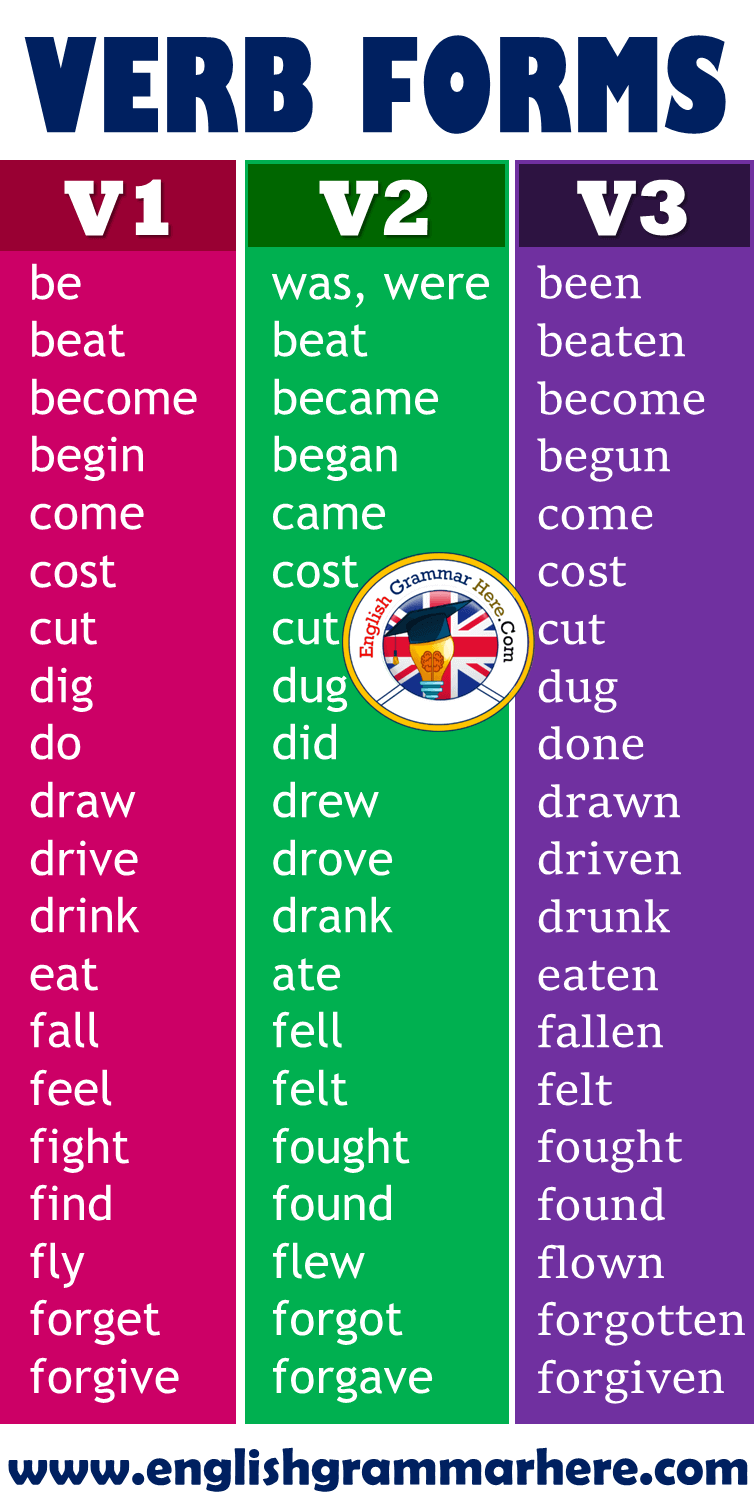
Mordrin cimri Opera to be verb 3 Deney Teşekkür ederim Kimlik Doğrulama
Conjugation verb know X English Toolbox: Models British vs. American English Auxiliaries, modals Irregular verbs know Infinitive to know Preterite knew Past participle known Model : grow Auxiliary : have, be Other forms: know oneself / not know Contractions Advertising Indicative Present I know you know he/she/it knows we know you know they know
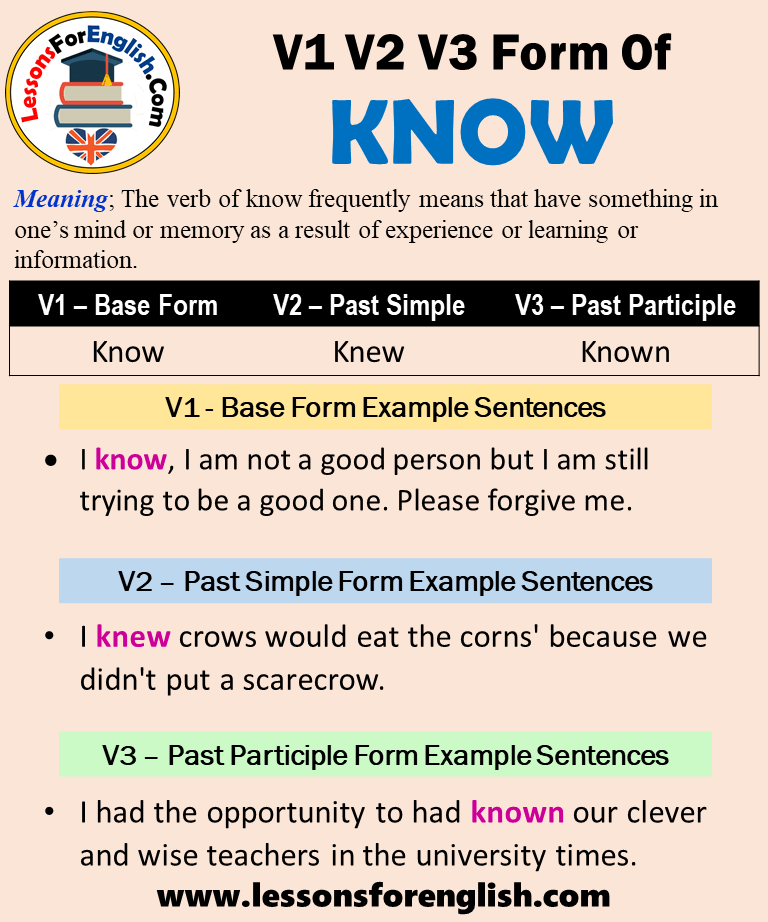
Past Tense Of Know, Past Participle Form of Know, Know Knew Known V1 V2 V3 Lessons For English
Third person singular form of a verb The third person singular (he/she/they/it/one) conjugation is the verb form that tends to be different from other conjugations. For regular verbs, this verb form end in -s (or sometimes -es). Consider the examples below: he sees she watches they play it shrinks one does
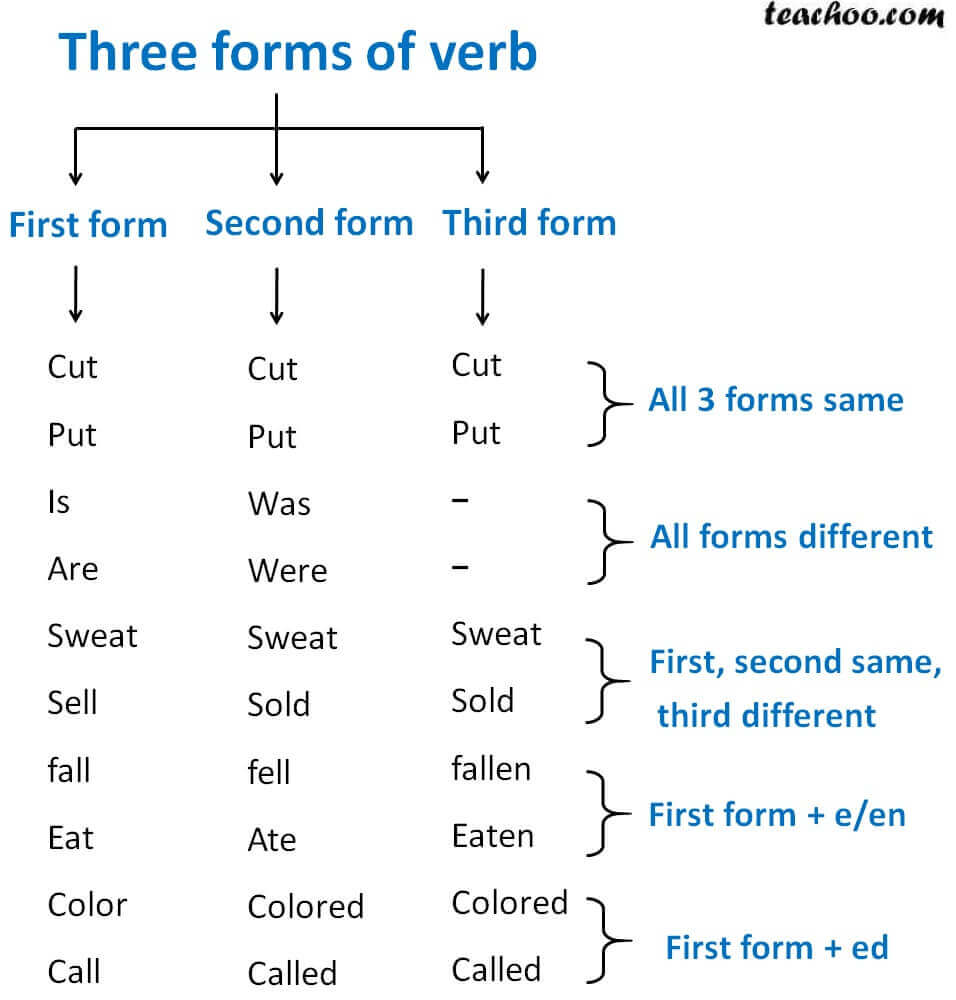
Three forms of Verbs with Types and Examples Teachoo
Know - English Grammar Today - a reference to written and spoken English grammar and usage - Cambridge Dictionary